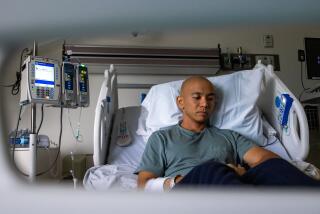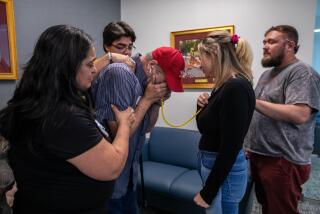Patients Taking Transplant Trail to China
- Share via
TAIPEI, Taiwan — After 18 months of dialysis, Chuang Che-ming’s ailing mother had had enough. She said she’d rather die from her failing kidney than continue.
With no kidney donor in sight, Chuang chose to follow a well-trod path these days in Asia. Smoothed by cash and a silent network of medical professionals, he took his mother to Mainland China for a transplant that saved her life.
Chuang, like untold numbers of Asians who have made the same trip, assumes the kidney came from one of the several thousand prisoners executed in China every year.
So when two men were arrested in New York recently and accused of offering organs of executed Chinese prisoners for transplant, the only surprise in Asia was that the network was expanding to North America.
For doctors and human-rights advocates, use of an inmate’s organs is an issue balancing a donor’s right to decide what happens to his body after death vs. the possibility of saving another’s life. In China, such high-minded considerations may take a back seat to the pursuit of cash.
High-level Chinese officials say taking organs without permission, as well as buying and selling them, is illegal. And kidney specialists outside China cite indications that Mainland authorities are trying to crack down--at least in population centers like Shanghai and Beijing.
But the money involved seems simply too much of a temptation. An official at China’s Justice Ministry acknowledged that law enforcement is spotty and conceded that trafficking in organs could occur.
Given the chance for a lifesaving operation, few transplant patients are inclined to quibble about moral pitfalls, or the high risk of infection from Mainland transplants, which are done quickly and often use organs that are removed in unsanitary conditions.
“We see to it that Taiwanese hospitals don’t violate ethical codes,” said Chang Shu-kang, secretary-general of Taiwan’s private Kidney Foundation. However, he added, “What Mainland China does is its own business.”
Indeed, what China does seems to be business--matching up willing buyers with a commodity in short supply.
Firm numbers for such transplants are rare, and those directly involved will not talk about it. But records show that at least 360 Taiwanese have had kidney transplants in China since 1990. Chuang’s mother was one.
He said he paid $12,000 to a hospital in southern China for his mother’s kidney transplant and $4,000 to a Hong Kong doctor who brokered the deal. In addition, he paid off the medical crew that did the surgery, and a Taiwanese doctor who introduced him to the Hong Kong doctor.
The Taiwan doctor raised the prospect of a transplant in China when Chuang’s 61-year-old mother grew tired of dialysis. In July 1995, the doctor told them to get ready to travel to China because of the impending execution of a prisoner whose blood matched.
In three days, Chuang’s mother had a new kidney. So did a dozen other ethnic Chinese--from Indonesia, the Philippines and Taiwan--who underwent surgery at the hospital in Zhuhai.
Chuang said two doctors performed three surgeries a day, each lasting about three hours.
“The Chinese doctors said nothing, but we all knew the kidneys were taken from executed prisoners,” Chuang said. “How else could one hospital get so many kidneys for transplant in one day?”
“If you need a transplant, you have no choice but to go to China,” he said. “It is the only country in the world that is bold enough to do this.”
China executes more people than any country in the world, usually by shooting. Amnesty International in Hong Kong estimates there were at least 4,367 executions in China in 1996.
Robin Munro, at the Hong Kong office of Human Rights Watch Asia, said recent changes in Chinese law will allow executions by lethal injection and permit them to be conducted at prisons in addition to the current execution grounds.
That is likely to make transplants easier and more sanitary.
Munro said he was not surprised that the two men arrested in New York were allegedly trying to sell kidneys, livers, skin, corneas, pancreases and lungs to Americans.
“From what we know about this business in China, it’s massive and ghoulish already,” he said. “In the spirit of raw enterprise in China, this was just a matter of time.”
China has disassociated itself from those two men.
The Justice Ministry official in Beijing said that if trafficking takes place, it’s the exception rather than the rule. The official, who spoke on condition of anonymity, said he did not know whether there had been any prosecutions for trafficking or stealing organs.
A Thai kidney specialist, Dr. Phaibul Jitprahphai, said he was contacted by a Chinese doctor seven or eight years ago offering prisoners’ kidneys. He refused, but Phaibul said the doctor comes to Bangkok occasionally to look for patients. He suspects nurses in several hospitals find them.
It’s not that hard. There are more than 2,500 patients waiting for kidneys in Thailand, and only about 250 kidneys become available annually. Phaibul said the cost of a transplant in China now runs $30,000-$37,500 and is constantly rising.
On a trip to Shanghai several years ago, Phaibul said he saw paperwork for transplants at People’s Hospital No. 5. The papers, written in English, did not include consent forms from donors, he said.
Phaibul said he was told by doctors that the state owns everything in a patient’s body, so no consent was necessary.
Associated Press correspondents Robert Horn in Bangkok, John Leicester in Beijing and Mark J. Porubcansky in Hong Kong contributed to this report.
More to Read
Sign up for Essential California
The most important California stories and recommendations in your inbox every morning.
You may occasionally receive promotional content from the Los Angeles Times.













